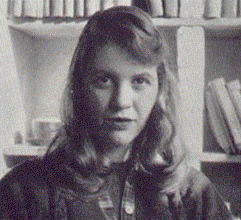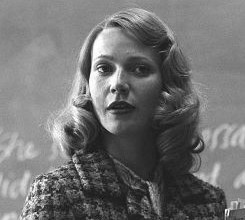|
Two thumbs down. Scoop's comments in white, Before I saw this film, I was not particularly knowledgeable about the poetess Sylvia Plath. I know that she was an unlikely 20th century poet - not the expected wild-eyed Bohemian, but a bourgeois middle-American who looked like she would have been more at home in a Betty Crocker cook-off than in a Greenwich Village coffee shop (see her image to the right). I know that she tried to commit suicide several times, starting when she was ten years old, and coming very close to success in that endeavor between her junior and senior years at Smith. By her own count, as detailed in "Lady Lazarus", she tried to kill herself three times unsuccessfully. She finally succeeded at ending her life on the fourth attempt, when she stuck her head in an oven shortly after the unhappy dissolution of her marriage to poet Ted Hughes. I know that many people consider her a great poet. I don't know about that. I don't like her work, but I'm not really interested in any 20th century poetry after T.S. Eliot, and I don't really get into morbid self-absorption, so that's just my taste kicking in. Let's assume she was top-drawer. But I'll tell you this. She sure wasn't much of a novelist. I read The Bell Jar and I found it to be completely without merit of any kind. I also know that nobody really knows what the hell was wrong with her head. She was not abused or tortured in childhood. She never had much hardship in her life. She didn't experience the tragic death of any of her children. No major traumas like that. She was a brilliant student, an attractive woman, and a successful author. She had two beautiful children. She was said to be a happy child until she was about ten, at which point her father died, and she gradually took on more and more manic-depressive behavior characteristics, and an increasing morbidity. In her life, and in her work, she talked about death so much that she made Jim Morrison seem as life-affirming as Zorba the Greek. |
|
|
The death of a parent and the dissolution of a marriage are difficult circumstances, but similar things happen to most people, and they do not spend their lives sticking their heads in ovens or popping sleeping pills. Clearly she was messed up, and one naturally wonders if there is some explanation, some insight, perhaps to be found in her own words. That is what I knew before I saw the movie. That is still all I know. No further illumination, in fact not even that much illumination, will be found in this film, which simply hits upon some biographical highlights chronologically. It can't use her poetry to illuminate her mental condition, because Plath's estate would not allow her poetry to be quoted in this film. In fact, the script really didn't capture the nature of her mental illness. Ron Howard has taken some flack in his life for being a pedestrian, mainstream director, but he did quite a good job at demonstrating the nature of the mental illness in A Beautiful Mind, by using visual devices and by keeping some of the delusions hidden temporarily from the audience. These tactics allowed the audience to see through the eyes of the deranged mathematician, and to live in his reality. Sylvia accomplishes none of that. Whenever a depressive or paranoid episode is coming on, it alerts us and then suffocates us with the usual movie cliché - tragic and dissonant violin music. In other words, this is a film about a mentally unhinged poet, yet it offers no insight into her mental condition, and never uses her poems. Sylvia Plath without the poetry and without some insight into her mental illness is about as interesting as "Oklahoma!" without the songs. |
|



